Success in Major
According to UNLV:
- Advanced knowledge of math (differential equations and integral calculations).
- Advanced level in basic sciences.
- Great knowledge of computer science.
- Good understanding of statistics and various probabilities.
- Excellent knowledge of engineering.
- Deep understanding of the design principles of systems, processes and components.
- The skill to distill, explain, and resolve engineering-based task.
- The skill to design software that includes both hardware and software elements.
- The skill to initiate, design, and perform the necessary experiments including the following data collection, analysis, and interpretation.
- The skill to work in multidisciplinary teams.
- The skill of effective communication.
- The acceptance of professional/ethical responsibilities.
- And the understanding of the need to develop for further.
To be successful in computer engineering, it is necessary to have the following skills: advanced knowledge of math (differential equations and integral calculations), advanced level in basic sciences, great knowledge of computer science, good understanding of statistics and various probabilities, excellent knowledge of engineering, deep understanding of the design principles of systems, processes, and components, the skill to distill, explain, and resolve engineering-based task (UNLV) the skill to design software that includes both hardware and software elements, and the skill to initiate, design, and perform the necessary experiments including the following data collection, analysis, and interpretation, the skill to work on multidisciplinary teams, the skill of effective communication, the acceptance of professional/ethical responsibilities, and the understanding of the need to develop for further (UNLV).
All these skills are desired to be present in a good computer engineer and are mandatory to have for an excellent computer engineer.
It is necessary to master them and develop through the future career to remain highly-qualified professional in the market.
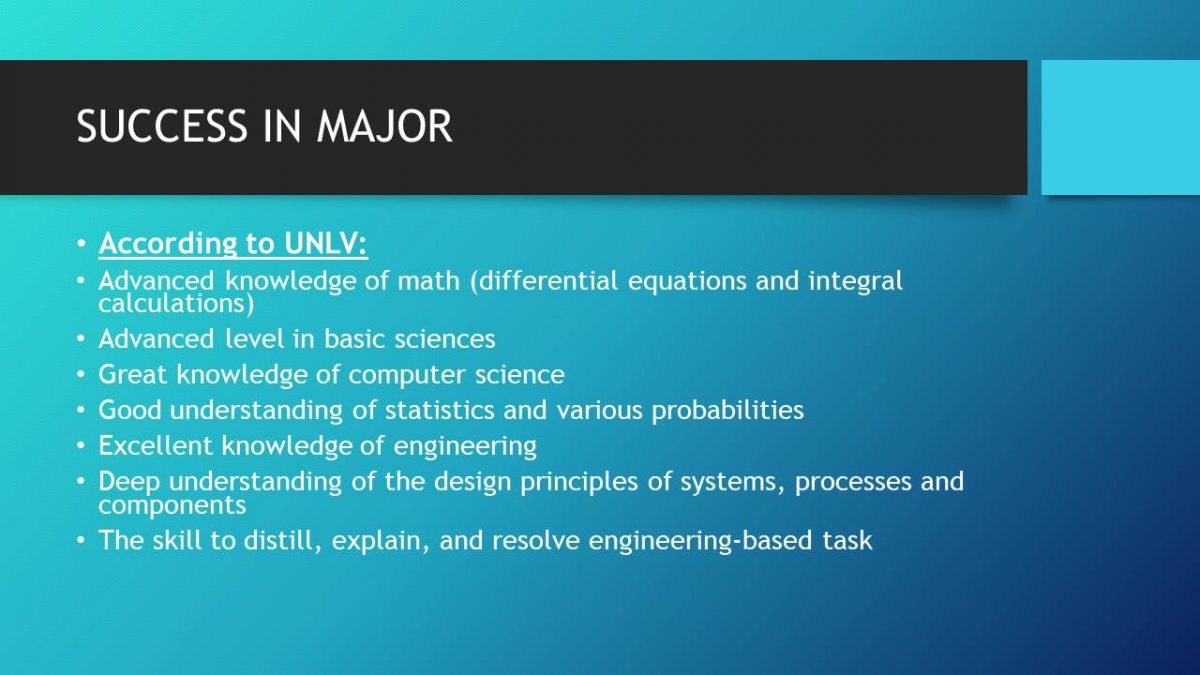
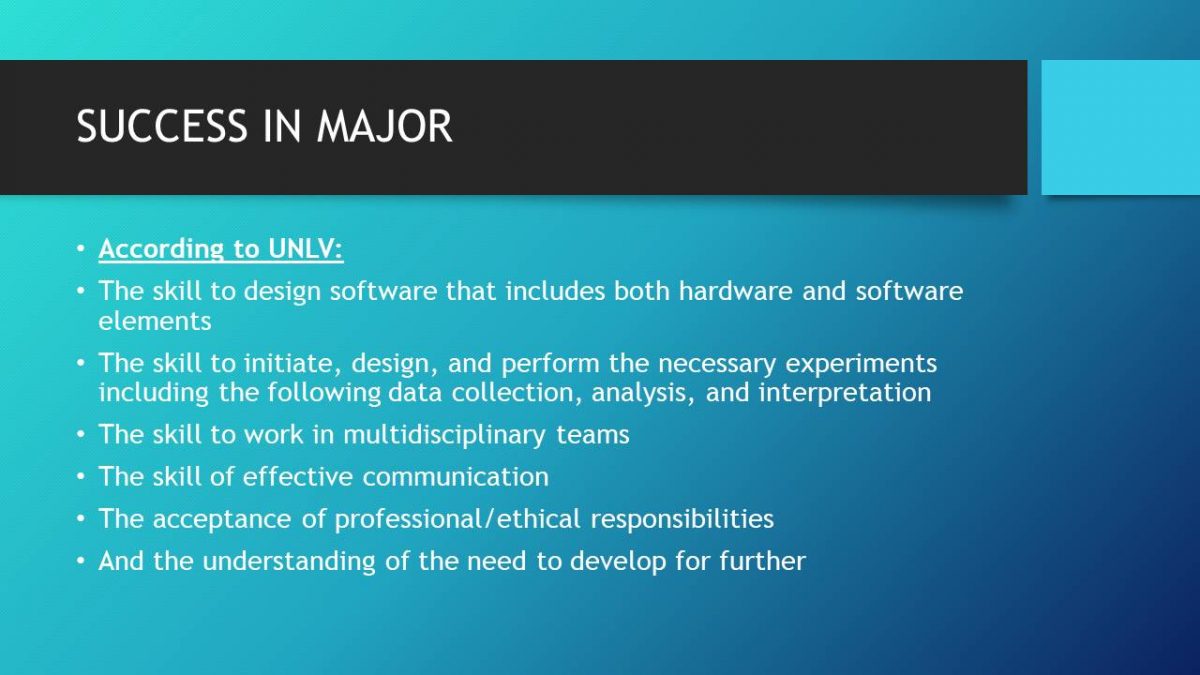
Success in Career
The candidate has five questions to answer (Benedictus par. 3-7):
- “Do you have an IQ higher than 130?”
- “What shall we have for dinner this evening?”
- “Why did you choose the last five articles you read?”
- “Are you incompetent and lazy?”
- “Do you have a track record of doing something really well?”
To be a successful computer engineer in Google, it is necessary to pass the unusual interview:
- Answer 5 questions (Benedictus par. 3-7):
- “Do you have an IQ higher than 130?” – better not to say Yes – it is arrogant and means the candidate will not want to learn something new.
- “What shall we have for dinner this evening?” – better to have the direct answer – it shows engagement.
- “Why did you choose the last five articles you read?” – better to have the direct answer – it shows that the candidate does not waste time for meaningless activities.
- “Are you incompetent and lazy?” – better to say Yes – it shows that the candidate is ready to admit that there are limits to his capabilities.
- “Do you have a track record of doing something really well?” – better to say No – it shows that the candidate does not have clichés in his/her head and can demonstrate unusual approaches to problem solving tasks.
Head of people operations Laszlo Bock is the person who makes the final decision (Lamont par. 1)
He cares about four things (Lamont par. 9):
- “general cognitive ability”.
- “emergent leadership”.
- “cultural fit” or “Googleyness”.
- “expertise”.
Two million people want to get a job at Google every year. Laszlo Bock runs this process and decides who fits the requirements of the company and who does not. There are four things Bocks cares about and wants from a candidate to have it. The first one is “general cognitive ability” (Lamont par. 9). It is the ability to absorb and accumulate information. The second one is “emergent leadership” (Lamont par. 9). If a candidate sees a problem, he or she steps in to address it and step out when these efforts are no longer needed. The third one is “cultural fit” or “Googleyness” (Lamont par. 9). It is about intellectual humility and ability to learn something new. Finally, the fourth one is “expertise” (Lamont par. 9). A candidate must have the appropriate qualifications.
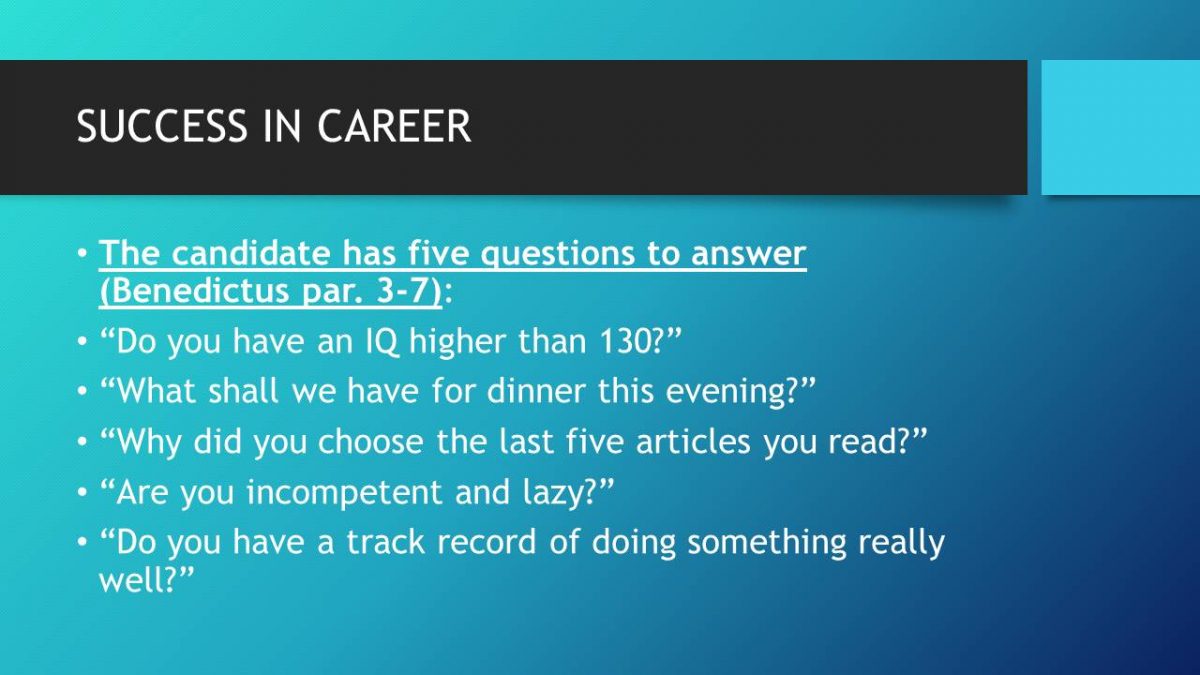
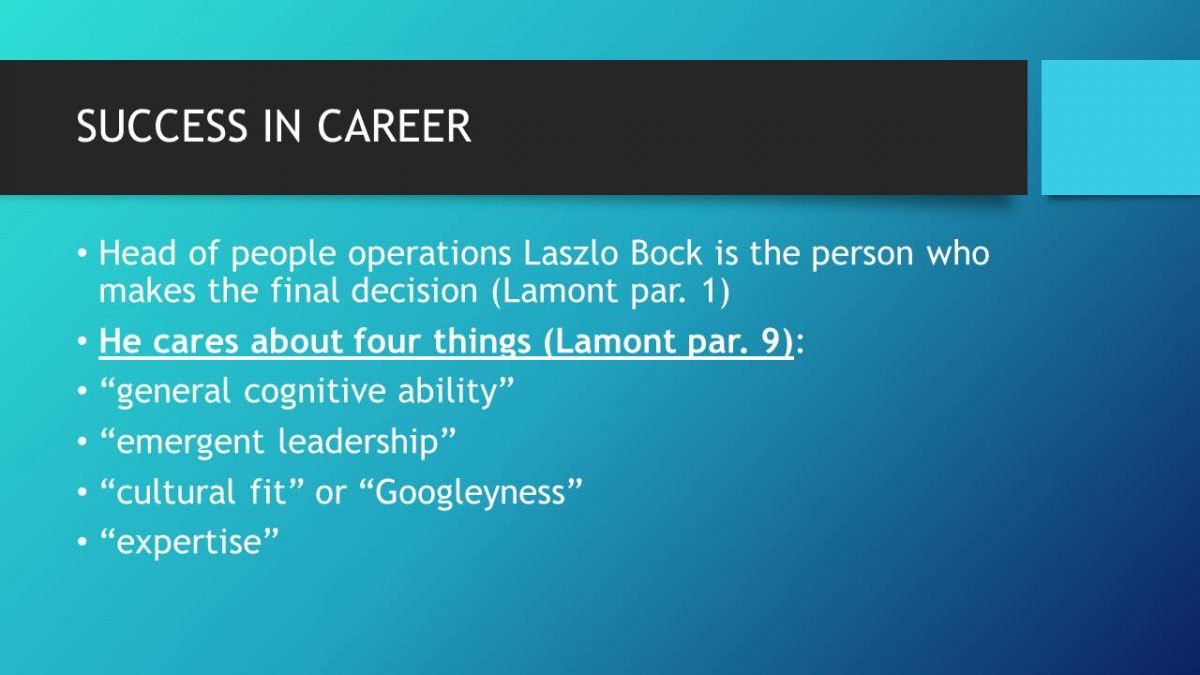
Behaviors to succeed
- Successful people act responsibly and conscious (Caprino par. 2).
- Successful people avoid (Tobak par. 5-14):
- Panic.
- Fanaticism.
- Laziness.
- Naivety.
- Selfishness.
- Oversensitivity.
- And everything else that distracts such people from their goals.
- Successful people act as true leaders (Folkman 2).
Successful behaviors of a computer engineer is as important as the same a top manager has. It is very important to be responsible for actions, words, and thoughts. It is critical for a successful computer engineer to act consciously (Caprino par. 2) because conscious steps determine success by allowing to avoid ‘unsuccessful’ behaviors. People who achieved success usually avoid such things as panic, fanaticism, laziness, naivety, selfishness, oversensitivity, and everything else that distracts them from their goals (Tobak par. 5-14). Finally, even a computer engineer must act as a true leader if he or she wants to achieve success in life (Folkman 2). It is necessary to have strategic perspective, build relationships, be courageous, inspire, develop and support people, and be focused on results rather than on own weaknesses (Folkman 3).
To sum up, the true success is the result of hard work and self-development but not some lucky lottery ticket.
It is necessary to behave life as a successful person to get the chance to become one.
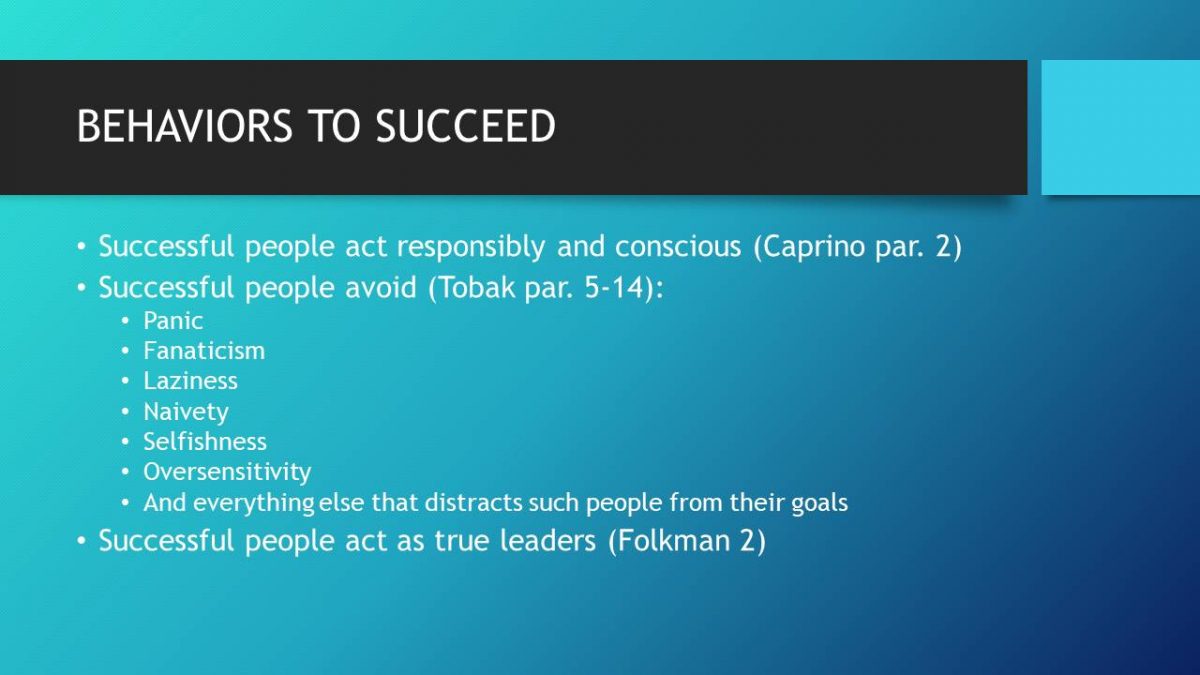
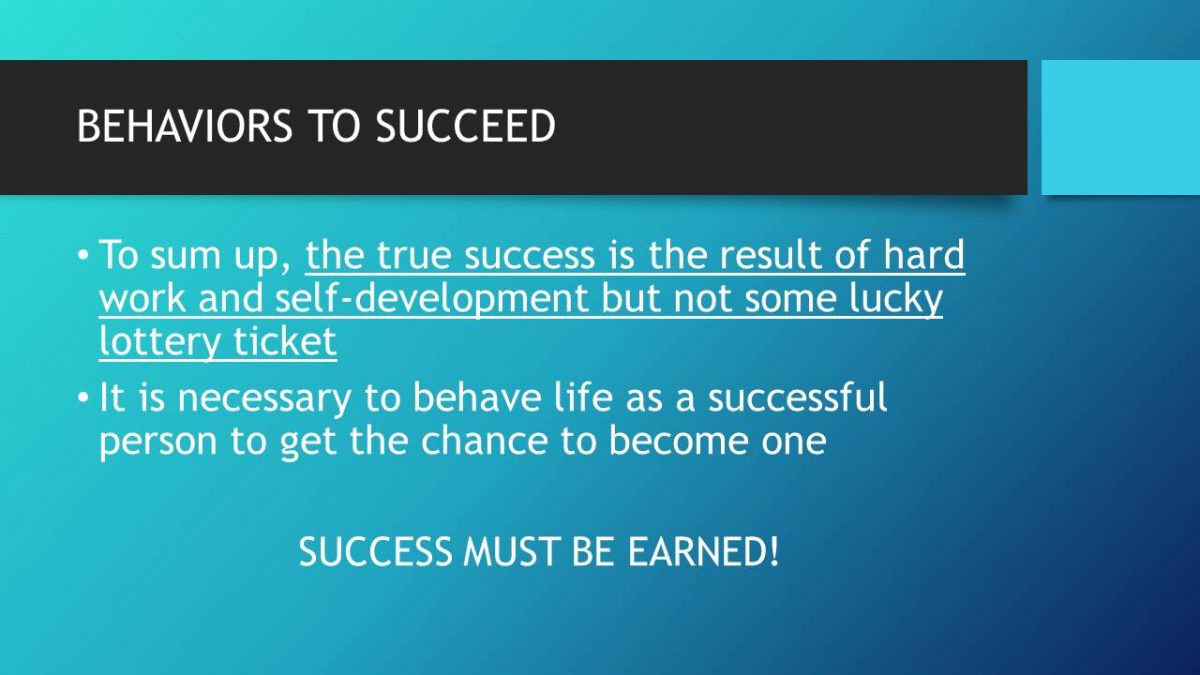
Works cited
Benedictus, Leo. “Want to Work for Google? Answer these Five Questions.”The Guardian. 2014.
Caprino, Kathy. “Successful People: The 8 Self-Limiting Behaviors They Avoid.”Forbes.
Folkman, Zenger. Top 9 Leadership Behaviors that Drive Employee Commitment. 2010. Web.
Lamont, Tom. “How to Get a Job at Google: Meet the Man Who Hires and Fires.”The Guardian. 2015.
Tobak, Steve. “10 Behaviors You Never See in Successful People.” Entrepreneur. 2015. Web.
UNLV. Bachelor of Science in Computer Engineering. 2015.